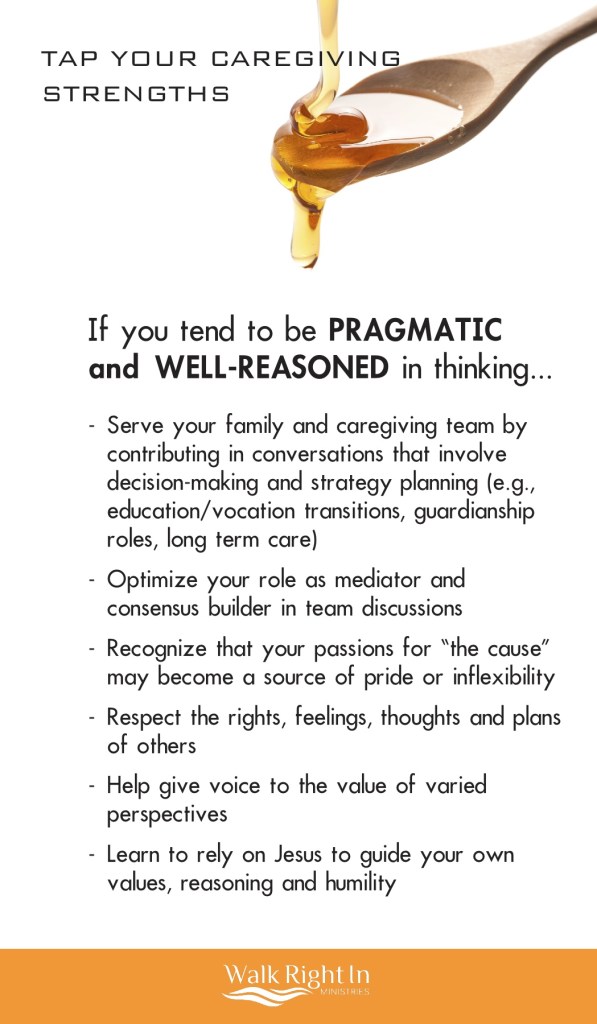
This is the fourth article in a series exploring what puts family caregivers in their “sweet spots” when supporting a family member with special needs. Today we’re looking at some challenges and opportunities for caregivers who think deeply.
Do you have a thirst for knowledge? Do you have a strong capacity to thoughtfully weigh a variety of options when you’re at a crossroads? Perhaps you’re the one in the family who researches therapy and treatment options. Do you have a helpful critical eye when it comes to reviewing details on your child’s Individualized Education Plan (IEP)? When someone suggests it’s time to start thinking about guardianship or future planning for your loved one with special needs, are you already two steps ahead starting the file with background information?
I’m a thinker so I can appreciate the tension you may live in. Your thoughtful and pragmatic ideas are of great value to your complex family. But you may have trouble sleeping at night!
Deep thinking people have a wonderful coping tool built right into them by God. Their moods and anxiety can be shifted by their thinking process alone. But that means it’s important to stay on guard about the tone and focus of your thought life. A great motto from scripture for the deep thinker is found in Philippians 4:8, which says:
“Fix your thoughts on what is true, and honorable, and right, and pure, and lovely, and admirable. Think about things that are excellent and worthy of praise.”
When you are raising a child with disabilities or caring for a loved one with complex needs, there is always plenty to think about. There are decisions to weigh, strategies to plan, causes to support, and perspectives to consider. It’s wonderful to have someone on the caregiving team who has the capacity for keen observation and analysis. You may even be energized by serving the caregiving team through a role of that nature. But you may also feel prone to anxiety if forced to bear this role alone or under pressures of deadlines.
If you’re someone who spends a lot of time “in your head,” try to have some quiet time alone for positive thinking every day. This may feel impossible for a caregiver whose attention is required without interruption. But if you understand how important those few minutes are toward keeping you in your sweet spot, you will prioritize finding a way.
Explain the significance of your need for this kind of intentional quit time to family and caregiving team members. As for help and creative ideas that will allow you to make it happen. Consider a cooperative exchange with someone who can trade responsible times with you so that each of you has opportunity to re-fuel your soul. Let me give you an example from my house. My husband will wrestle with our daughter for a few minutes or snuggle with her on the couch watching a movie so that I can take a break. Then he will do his workout while I give her a shower.
It can be difficult, at times, for deep thinking people to be at peace with themselves, others and even God. You may have high expectations, particularly of yourself. And you may see things clearly in ways that don’t always line up with how others see them. It may help you to meditate periodically on Psalm 51.
To live in your strengths, you will need to learn to make healthy attitude and behavior adjustments by the power of the Holy Spirit.
To stay in your sweet spot, you will also need to learn to deal constructively with anger. Yelling, screaming, hollering, throwing objects, hitting, being passive-aggressive and burying or denying your anger are all destructive responses.
You may find that one of your strengths is that you have the ability to analyze your way through anger. Once you recognize and admit your feelings, you’re able to think through the situation and come to a decision about how you are going to choose to move forward in a positive way. Be on guard, however. The longer you think about the situation, the more vulnerable you may be to becoming depressed, or growing even angrier. Be careful about isolating yourself when you’re angry. Reaching out to a close trusted friend for prayer and processing can help you avoid a negative spiral.
Friend, give yourself and others the right to be imperfect. Forgive yourself and others for mistakes. And talk through your disappointments with God in prayer. Forgiving doesn’t mean you have to move on like nothing ever happened. But it does mean choosing not to harbor negative feelings. Forgiveness and healing often involve a process of choosing, again and again, to forgive until the negative feelings are genuinely resolved.
TAP YOUR CAREGIVING STRENGTHS BY REMEMBERING, OFTEN, THE FAITHFUL WAYS OF GOD
If you tend to think deeply…
- Seek a role on the caregiving team where your keen observation and analytical skills are needed
- Work toward an adequate balance of work, exercise, diet and relaxation
- Learn to keep your mind more present in the activities and relationships of the moment (less on past and future)
- Express appreciation to others frequently and specifically
- Resist analysis and criticism that can feel discouraging to others
- Release others and yourself from unreasonable expectations
- Allow flexibility to work at your own pace whenever possible
- Learn to slow down, letting your moods and thinking patterns rest with Jesus
Here are some tips if you are someone who tends to be pragmatic and well-reasoned in your thinking…
- Serve your family and caregiving team by contributing to conversations that involve decision-making and strategy planning (e.g., education/vocation transitions, guardianship roles, long term care)
- Optimize your role as mediator and consensus builder in team discussions
- Recognize that your passions for “the cause” may become a source of pride or inflexibility
- Respect the rights, feelings, thoughts and plans of others
- Help give voice to the value of varied perspectives
- Learn to rely on Jesus to guide your own values, reasoning and humility


The Bible offers an abundance of help and encouragement for thoughtful people:
Philippians 4:8
Fix your thoughts on what is true, and honorable, and right, and pure, and lovely, and admirable. Think about things that are excellent and worthy of praise.
Galatians 5:16
So I say, let the Holy Spirit guide your lives. Then you won’t be doing what your sinful nature craves.
Psalm 94:19
When doubts filled my mind, your comfort gave me renewed hope and cheer.
Proverbs 14:10
Each heart knows its own bitterness, and no one else can fully share its joy.
1 Corinthians 13:12
Now we see things imperfectly, like puzzling reflections in a mirror, but then we will see everything with perfect clarity. All that I know now is partial and incomplete, but then I will know everything completely, just as God now knows me completely.
1 Thessalonians 5:16
Always be joyful. Never stop praying. Be thankful in all circumstances, for this is God’s will for you who belong to Christ Jesus.
2 Corinthians 10:3-5
We are human, but we don’t wage war as humans do. We use God’s mighty weapons, not worldly weapons, to knock down the strongholds of human reasoning and to destroy false arguments. We destroy every proud obstacle that keeps people from knowing God. We capture their rebellious thoughts and teach them to obey Christ.
Proverbs 3:6
Seek his will in all you do, and he will show you which path to take.
Lord Jesus, take my mind to a quiet and content place with you. Make a way for me to have a daily routine that includes quiet time to let you fill my mind with truth and encouragement. When my thoughts are racing and my passions are strong, remind me of Your faithfulness. I am tremendously capable of the assignments you give me, only because your Holy Spirit fills me with power and wisdom. Yet I am easily discouraged and often stubborn. Show me how to live. Show me how to serve my family well. Teach me to have reasonable expectations of myself and others. My hope is best placed in You alone. Amen
Feel free to share the “Tap Your Caregiving Strengths” graphics in this article on your social media to encourage others. You can follow the entire “sweet spots” series here.
Tell us in the comments what helps you and your caring family!

Lisa Jamieson is a caregiver consultant, pastoral counsellor and author of popular books and Bible studies including Finding Glory in the Thorns and Jesus, Let’s Talk. Lisa and her husband, Larry, live in Minnesota with the youngest of their three grown daughters, Carly, who has Angelman Syndrome. Together, the Jamiesons founded Walk Right In Ministries in 2008, a non-profit organization building faith and community with special needs families. Lisa is the primary contributor on the www.WalkRightIn.org blog sharing practical and spiritual encouragement for parents and other family members caring for children with health and developmental challenges. She also serves on the Key Ministry writing team where she contributes monthly articles for special needs parents and church leaders. Her personal blog www.lisajamieson.org also provides encouragement for people who find themselves in challenging places.











Thank you for this, Lisa. I think you spent a few days in my life and in my head to capture this article! These are excellent points that I will be sharing.
It’s very encouraging to hear from others who are resonating! I’m so glad there was some help for you in the article and we sure appreciate your sharing it. Praying right now that Jesus renews your mind in truth, comfort, hope and peace!